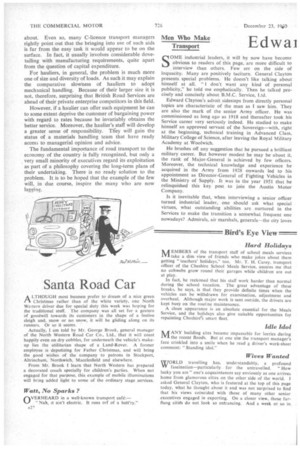Importance of Handling
Page 23

Page 24

If you've noticed an error in this article please click here to report it so we can fix it.
A. CONSIDERABLEamount of comment each year is devoted, in goods transport circles, to materials handling—a subject that is becoming more and more important. Most operators are now uncomfortably aware that too much vehicle-time is being wasted in standing idle at banks whilst loading and unloading are proceeding. Not so many operators seem prepared actively to do much about it. The increasing use of semi-trailers and containers, and the possibility of utilizing demountable bodies, are manifestations of operators' awareness and preparedness to adopt changed methods of operation.. But the adoption of handling aids seems to be .a slightly different matter.
Many exampleswere given at the Institute of Materials Handling conference in Sheffield last November of building plans being passed by a company's board without consideration being given to the necessary accompanying handling facilities, including vehicle loading. It was emphasized by Mr. C. G. Chantrill, a consultant, that materials handling should be applied as a philosophy, not as a technique. The opportunity for a direct liaison between the transport and handling specialist and the board was generally accepted as essential to overall economy.
Road transport itself represents an aspect of materials handling and, as in the case of other forms of handling, appraisal of the manifold factors involved has often been divorced from management Considerations relating to production, plans for expansion, market trends, and so on. The transport manager of a manufacturing company who is given a free hand and sufficient funds to provide an efficient service is, by normal standards, highly favoured by his management and he may be expected to make the best use of his authority.
High Status Mr. Chantrill gave a formidable list of production and marketing factors that must be made available to the specialist before he can be expected to formulate a plan to promote handling efficiency. No less a person than the managing director could normally supply the information required, and then only with the active advice of his senior staff.
The high status due should, therefore, give the specialist the right to probe where he will. This might well be a stumbling block in many instances, because the board often are unwilling to allow anyone who is not in a high executive position to obtain a detailed insight into the finances of the company. The weight of evidence given at the conference in favour of such a policy is, however, a valid testimony of its worth. Any company that neglects to exploit the very ubstantial benefits that can be derived from an up-to-date materials ha dling programme may well sacrifice large-scale economies.
The majority of successful C-licence operators in this country operate a fleet of vehicles in conjunction with auxiliary services which may, for example, be represented by warehouse and distributive facilities. In this way the operator often caters for a demand that involves planning a series of operations over which he has a large measure of control. This, obviously, makes the adoption of handling equirirnent easier to bring about. Even so, many C-licence transport managers rightly point out that the bringing into use of such aids is far from the easy task it would appear to be on the surface. In fact, it usually involves considerable dovetailing with manufacturing requirements, quite apart from the question of capital expenditure.
For hauliers, in general, the problem is much more one of size and diversity of loads. As such it may explain the comparative slowbess of hauliers to adopt mechanical handling. Because of their larger size it is not, therefore, surprising that British Road Services are ahead of their private enterprise competitors in this field.
However, if a haulier can offer such equipment he can to some extent deprive the customer of bargaining power with regard to rates because he invariably obtains the better service. Moreover, the haulier's staff will develop a greater sense of responsibility. Tliey will gain the status of a materials handling team that have ready acces3 to managerial opinion and advice.
The fundamental importance of road transport to the economy of the country is fully recognized, but only a very small minority of executives regard its exploitation as part of a philosophy covering the long-term plans of their undertaking. There is no ready solution to the problem. It is to be hoped that the example of the few will, in due course, inspire the many who are now laggine.




























































































